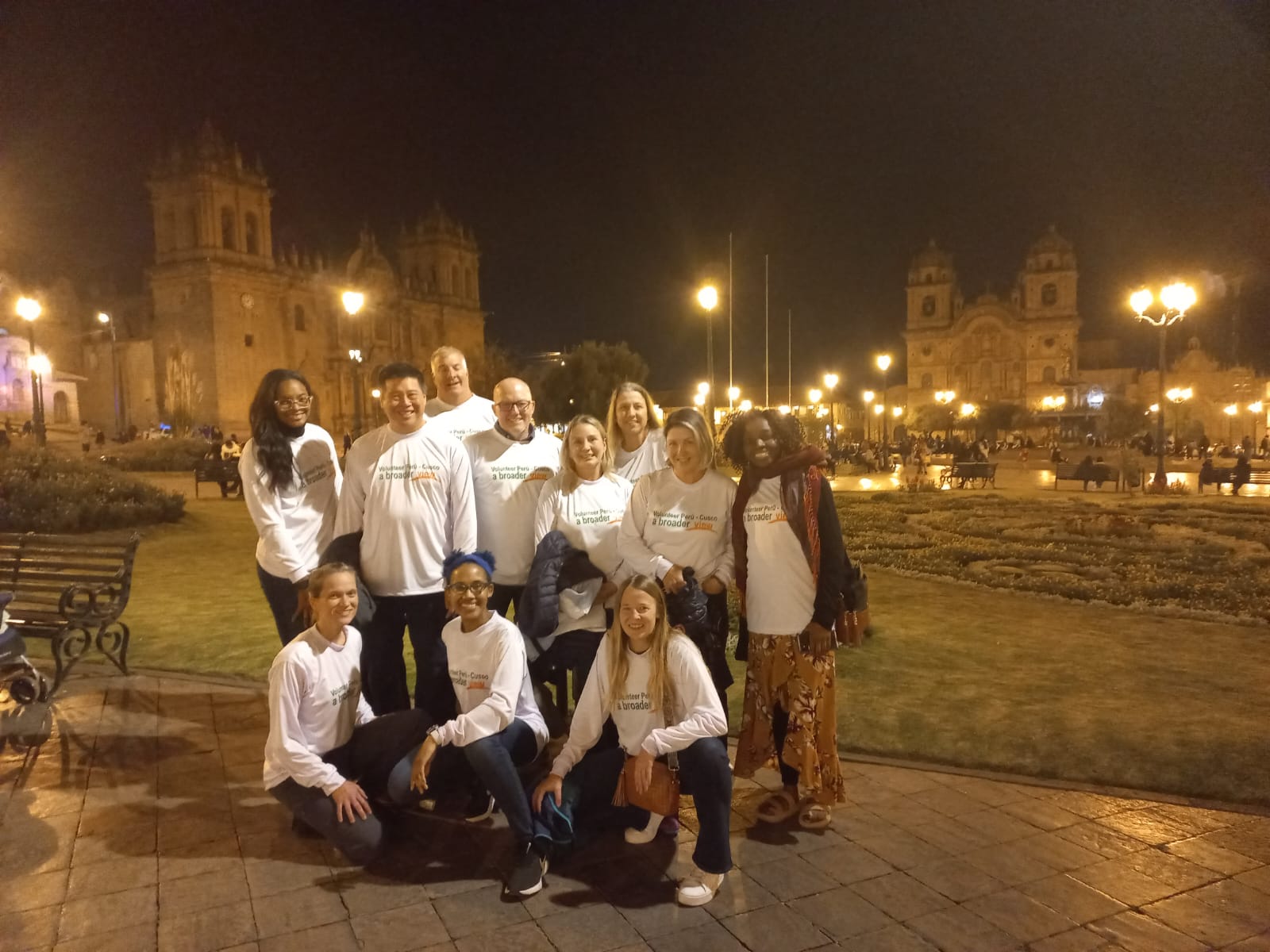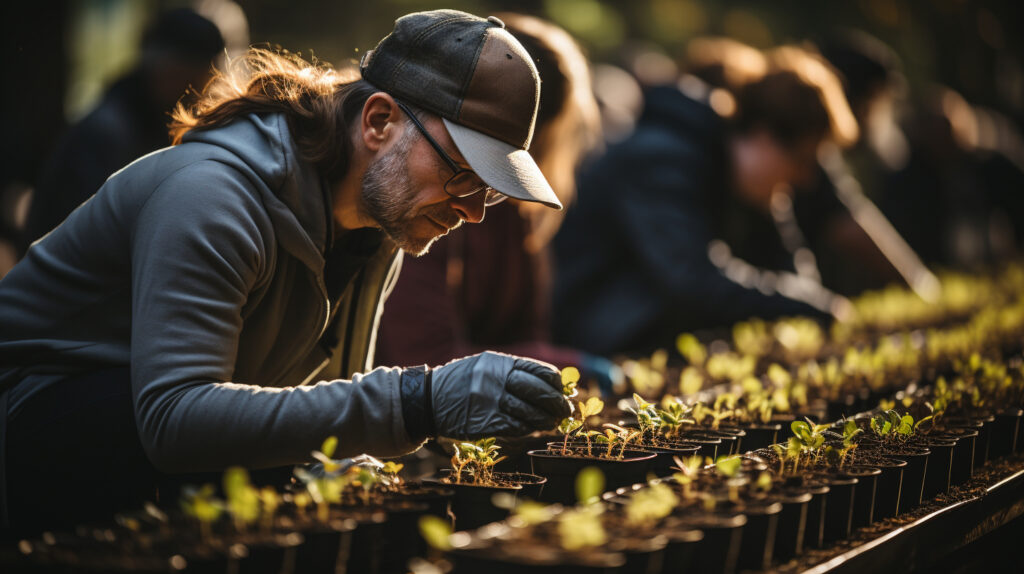Hey there! Are you passionate about making a positive impact on the world and creating a sustainable future? If so, you’re in the right place! In this article, we’ll explore the exciting world of volunteer opportunities in sustainable projects.
Sustainable development has become a pressing global issue in recent years, as we face the challenges of climate change, resource depletion, and social inequality. People from all walks of life are recognizing the need to take action and contribute to building a more sustainable world.
By volunteering in sustainable projects, you have the chance to make a real difference while gaining valuable experience and skills. Whether you’re interested in renewable energy, environmental conservation, waste management, or community development, there are countless opportunities available for you to get involved.
But before we dive into the various types of sustainable projects you can be a part of, let’s first understand what sustainable development is all about and why it’s so important in today’s world. So, let’s get started!
Understanding Sustainable Development
Sustainable development is a concept that has gained immense importance in recent years as we strive to build a better future for ourselves and the generations to come. But what exactly does sustainable development entail? Let’s explore the definition and principles behind sustainable development and understand why it is crucial in today’s world.
Definition and Principles of Sustainable Development
Sustainable development refers to meeting the needs of the present without compromising the ability of future generations to meet their own needs. It is about finding a balance between environmental, social, and economic factors, ensuring that we maintain resources for future use while improving the quality of life for all.
The principles of sustainable development include:
- Environmental Protection: Taking actions to conserve natural resources, reduce pollution, and protect ecosystems.
- Social Equity: Ensuring fair distribution of resources, opportunities, and benefits to all individuals and communities.
- Economic Viability: Promoting economic growth that is environmentally sustainable and beneficial for society as a whole.
- Inter-generational Equity: Considering the needs and rights of future generations in our decision-making process.
By adopting these principles, we can create a framework for development that respects both our current and future needs.
Importance of Sustainability in the Modern World
The concept of sustainability has become increasingly significant due to the numerous challenges our planet faces today. Here are a few reasons why sustainability is crucial in the modern world:
- Environmental Preservation: With the increasing threat of climate change, it is vital that we take measures to reduce our carbon footprint and preserve our natural environments for future generations.
- Resource Scarcity: The world’s population is growing rapidly, leading to increased pressure on natural resources. Sustainable practices help ensure that resources are used efficiently and conserved for future generations.
- Social Development: Sustainable development promotes social equity by addressing issues such as poverty, inequality, and access to basic services. It aims to create inclusive and thriving communities.
- Economic Stability: By integrating sustainability into our economic systems, we can create long-term economic stability and reduce the risk of disruptions caused by resource depletion or environmental disasters.
In summary, sustainable development is a vital framework that allows us to address environmental, social, and economic challenges while paving the way for a better future.
“Sustainability is not about changing the world overnight; it’s about taking small steps today that will make a big difference tomorrow.” – Unknown
Types of Sustainable Projects
When it comes to volunteering in sustainable projects, there are a wide range of options to choose from. Whether you have a passion for renewable energy, environmental conservation, waste management, or community development, there is a project out there that aligns with your interests and values. Here are some of the most common types of sustainable projects:
- Renewable Energy Projects: These projects focus on harnessing the power of renewable resources such as solar, wind, hydro, or geothermal energy. Volunteers can get involved in installing solar panels, constructing wind turbines, or promoting energy efficiency in communities.
- Environmental Conservation Projects: These projects aim to protect and restore natural ecosystems, biodiversity, and habitats. Volunteers may participate in activities such as wildlife monitoring, reforestation efforts, beach cleanups, or creating sustainable agriculture practices.
- Waste Management Projects: These projects tackle the issues of waste reduction, recycling, and proper disposal of waste materials. Volunteers can contribute by educating communities on waste management practices, implementing recycling programs, or organizing clean-up campaigns.
- Community Development Projects: These projects focus on improving the quality of life for communities while promoting sustainability. Volunteers may work on initiatives such as sustainable agriculture, clean water access, eco-tourism, or educational programs on environmental conservation.
By getting involved in these types of sustainable projects, you can make a meaningful contribution to creating a more environmentally friendly and socially responsible world. Not only will you be supporting positive change, but you will also have the opportunity to learn and grow personally.
Benefits of Volunteering in Sustainable Projects
Volunteering in sustainable projects not only benefits the environment but also offers numerous personal and professional advantages. By getting involved in these initiatives, you can make a positive impact on the world while gaining valuable experience and skills. Here are some of the key benefits of volunteering in sustainable projects:
1. Personal Growth and Skill Development
Volunteering in sustainable projects provides an opportunity for personal growth and skill development. Here are some ways in which it can benefit you:
- Enhanced problem-solving skills: Working in sustainable projects often involves finding innovative solutions to complex environmental challenges. This can sharpen your problem-solving skills and encourage you to think critically.
- Developed teamwork and communication skills: Many sustainable projects require collaboration and effective communication among team members. By volunteering, you can improve your teamwork and communication skills, both of which are highly valued in professional settings.
- Increased resilience and adaptability: Sustainable projects often encounter obstacles and setbacks. By volunteering in such initiatives, you will develop resilience and adaptability, essential traits in both personal and professional life.
- Expanded knowledge and understanding: Volunteering in sustainable projects exposes you to various environmental issues, technologies, and methodologies. This allows you to expand your knowledge and gain a deeper understanding of environmental sustainability.
2. Making a Positive Impact on the Environment
One of the most rewarding aspects of volunteering in sustainable projects is the opportunity to make a positive impact on the environment. Here’s how your efforts can benefit the planet:
- Promoting renewable energy: By contributing to renewable energy projects, you are helping to reduce reliance on fossil fuels and combat climate change. Your involvement can help accelerate the transition to a sustainable and cleaner energy future.
- Preserving ecosystems and biodiversity: Volunteering in environmental conservation projects allows you to participate in preserving ecosystems and protecting endangered species. Your efforts can help maintain a balanced and healthy environment for current and future generations.
- Reducing waste and promoting recycling: Waste management projects offer opportunities to minimize waste, promote recycling, and implement sustainable waste disposal practices. By volunteering in these initiatives, you are contributing to creating a cleaner and greener environment.
3. Creating Lasting Social Change
Volunteering in sustainable projects not only benefits the environment but also creates lasting social change. Here are some ways in which your involvement can make a difference:
- Empowering local communities: Sustainable community development projects focus on empowering local communities by providing them with education, resources, and opportunities. By volunteering in such projects, you can contribute to improving the quality of life for individuals and communities.
- Raising awareness and inspiring others: Through your involvement in sustainable projects, you can raise awareness about environmental issues and inspire others to take action. Your commitment to sustainability can motivate individuals and communities to adopt eco-friendly practices and make conscious choices.
- Driving policy and systemic change: Sustainable projects often aim to drive policy and systemic changes for a more sustainable future. By volunteering, you can be part of the movement that advocates for meaningful environmental policies and initiatives at local, national, and global levels.
Volunteering in sustainable projects offers a multitude of benefits, ranging from personal growth and skill development to making a tangible impact on the environment and driving lasting social change. Whether you are passionate about renewable energy, environmental conservation, waste management, or community development, there are numerous opportunities to get involved and make a difference.
Remember, every small step counts towards building a sustainable future. By volunteering in sustainable projects, you can be part of the solution and contribute to creating a better world for current and future generations. Make a choice to make a difference!
Finding Volunteer Opportunities
Are you interested in volunteering for sustainable projects but unsure of where to find opportunities? Don’t worry, we’ve got you covered! Here are some great ways to find volunteer opportunities in sustainable projects:
Local and International NGOs
- NGOs (Non-Governmental Organizations) are a fantastic resource for finding volunteer opportunities in sustainable projects. These organizations work tirelessly to address environmental and social issues around the world. They often have a wide range of projects that you can get involved in.
- Start by researching local NGOs in your area that focus on sustainability. They may have ongoing projects or specific campaigns that require volunteer help.
- If you’re looking for international opportunities, explore well-known NGOs like Greenpeace, World Wildlife Fund (WWF), or Conservation International. These organizations have projects in various countries and continents, offering you a chance to make a global impact.
Government Initiatives
- Many governments have initiatives and programs that promote sustainability and rely on volunteers to implement them. Keep an eye out for government websites, particularly in the environmental or sustainable development departments. These websites often have dedicated sections for volunteer opportunities.
- Check if your local government has any sustainability-focused projects or volunteering programs. It could be initiatives related to renewable energy, waste management, or community development. Volunteering with a government initiative will not only give you valuable experience but also create a direct impact at the local level.
Online Platforms and Databases
- Thanks to the internet, you can access a plethora of online platforms and databases that connect volunteers with organizations and projects. These platforms make it convenient to find opportunities based on your interests, location, and time availability.
- Websites like VolunteerMatch, Idealist, and GoAbroad specialize in listing volunteer opportunities worldwide, including in sustainable projects. You can search for specific keywords like “sustainability,” “environment,” or “renewable energy” to narrow down your options.
- Additionally, social media platforms like Facebook and LinkedIn have groups and communities dedicated to volunteering. Join these groups and stay active to receive updates on volunteer opportunities and connect with like-minded individuals.
Remember, before committing to a volunteer opportunity, take the time to research the project and organization to ensure their values align with yours. It’s also essential to consider your skills, interests, and time availability when choosing a volunteer project.
“Volunteering is the ultimate exercise in democracy. You vote in elections once a year, but when you volunteer, you vote every day about the kind of community you want to live in.” – Marjorie Moore
Preparing for Sustainable Volunteering
Volunteering in sustainable projects is a meaningful and rewarding experience that allows you to contribute to the greater good while gaining valuable insights and skills. Before embarking on your journey as a sustainable volunteer, it is essential to adequately prepare yourself. Here are some key steps to help you get ready for your sustainable volunteering experience:
Researching the Project and Organization
- Do your homework: Start by researching the specific project and organization you are interested in. Learn about their mission, values, and the impact they have made in the past.
- Understand the project goals: Familiarize yourself with the objectives and goals of the sustainable project you will be volunteering for. This will help you align your efforts and make a more significant contribution.
- Learn about the community: Take the time to understand the local community where the project is located. This includes their culture, customs, and challenges they face. Being aware of these factors will help you be more respectful and effective in your role.
Understanding Cultural Sensitivity and Local Customs
- Respect cultural norms: Each community has its own set of customs, traditions, and social norms. It is crucial to respect and adhere to these customs to build trust and establish positive relationships with the local community.
- Be open-minded: Embrace different perspectives and approaches to problem-solving. Recognize that there may be different ways of achieving sustainable development, and be willing to learn from the local community.
- Practice effective communication: Language barriers can be a challenge, but using gestures, facial expressions, and basic phrases can help bridge the gap. Non-verbal communication can often convey more than words alone.
Obtaining Necessary Skills and Certifications
- Identify necessary skills: Assess the skills you currently possess and determine which ones are relevant to the sustainable project you will be involved in. This could include skills such as construction, project management, or environmental conservation techniques.
- Acquire additional certifications: If there are specific certifications or training programs that are required for the project, make sure to obtain them before volunteering. This will increase your effectiveness and ensure your safety during project implementation.
- Gain relevant experience: If possible, try to gain practical experience or internships in related fields before embarking on a sustainable volunteering journey. This could include volunteering with local organizations or participating in workshops and training programs.
By adequately preparing for your sustainable volunteering experience, you will be equipped with the necessary knowledge, skills, and cultural sensitivity to make a meaningful impact. Remember that sustainable development is a collaborative effort, and your role as a volunteer is essential in building a better and more sustainable future for all.
Fieldwork and Hands-on Experience
Engaging in fieldwork and hands-on experience plays a crucial role in sustainable volunteering. It allows volunteers to actively contribute to projects and make a tangible impact on the ground. Here’s a closer look at some of the fieldwork opportunities available in sustainable projects:
Working on Renewable Energy Installations
Renewable energy projects are at the forefront of sustainable development efforts. As a volunteer, you may have the opportunity to work on solar panel installations, wind turbine maintenance, or even help develop sustainable heating and cooling solutions. This hands-on experience will not only give you technical skills but also a deeper understanding of the importance of renewable energy in creating a sustainable future.
Nature Conservation and Reforestation Efforts
Protecting and restoring natural habitats is crucial for preserving biodiversity and combating climate change. Volunteering in environmental conservation projects may involve activities such as tree planting, wildlife monitoring, and habitat restoration. By working directly in nature, you’ll witness the impact of your efforts and contribute to the sustainability of ecosystems.
Community Empowerment and Education
Sustainable development goes beyond environmental conservation. It also aims to empower communities and improve their quality of life. As a volunteer, you may have the opportunity to work with local communities, helping them develop sustainable agriculture practices, promoting eco-tourism initiatives, or conducting educational workshops on topics like waste management and conservation. This hands-on experience will allow you to directly engage with the community and understand the social aspects of sustainability.
By actively participating in fieldwork and hands-on activities, you’ll gain invaluable knowledge and skills that go beyond theoretical learning. This practical experience will provide you with a deeper understanding of sustainability and a greater appreciation for the challenges and rewards of sustainable development.
> **Tip:** Remember to document your fieldwork experience through photos, videos, and written reflections. This will not only serve as a valuable learning resource but also allow you to share your experiences with others and inspire more people to get involved in sustainable volunteering.
Next section: Measuring Impact and Success
Measuring Impact and Success
Measuring the impact and success of sustainable projects is crucial in order to determine their effectiveness and identify areas for improvement. By tracking specific metrics, assessing social and economic benefits, and evaluating the long-term sustainability of projects, organizations can gauge the progress and outcomes of their efforts. Here are some key factors to consider when measuring the impact and success of sustainable volunteering:
Tracking Environmental Metrics
- Carbon footprint reduction: Calculate the amount of greenhouse gas emissions reduced by renewable energy projects or changes in waste management practices.
- Energy and water consumption: Monitor the amount of energy and water saved through efficient technologies and conservation measures.
- Biodiversity conservation: Measure the increase in biodiversity and the protection of ecosystems through reforestation efforts and habitat restoration.
- Waste reduction: Track the volume of waste diverted from landfills through recycling and composting initiatives.
Assessing Social and Economic Benefits
- Community engagement: Evaluate the level of community involvement and empowerment in sustainable projects, including participation in decision-making processes.
- Health and well-being: Measure improvements in the quality of life, access to clean water and sanitation, and overall health and well-being of local communities.
- Economic impact: Analyze the economic benefits of sustainable projects, such as job creation, income generation, and entrepreneurship opportunities.
- Education and awareness: Assess the level of knowledge and awareness about sustainability among community members, as well as the impact of educational initiatives.
Long-Term Sustainability of Projects
- Continued impact: Consider the long-term effects and persistence of positive changes brought about by sustainable projects.
- Community ownership: Evaluate the extent to which the local community has taken ownership of the projects and continues to maintain and support them.
- Replicability and scalability: Assess the potential for scaling up or replicating successful projects in other regions or communities.
- Partnerships and collaborations: Measure the effectiveness of partnerships with local organizations, government bodies, and other stakeholders in ensuring the sustainability of the projects.
“Measuring impact and success is not just about numbers and statistics; it’s about understanding the real-life impact of sustainable projects on the environment and communities.”
Challenges and Solutions in Sustainable Volunteering
Volunteering in sustainable projects can be incredibly rewarding, but it’s important to acknowledge that there can be challenges along the way. From dealing with language barriers to overcoming resistance to change, it’s essential to be prepared for these obstacles and have strategies in place to address them. Here are some common challenges in sustainable volunteering and potential solutions to tackle them:
Language and Cultural Barriers
When volunteering in a foreign country, you may encounter language and cultural barriers that can hinder effective communication and collaboration. These barriers can make it difficult to understand local customs, convey instructions, or build relationships with the community members. However, there are solutions to overcome these challenges:
- Preparation: Before embarking on your volunteering journey, take the time to learn some basic phrases in the local language. This will make a big difference in breaking the ice and building a connection with the locals. Additionally, educate yourself about the culture and customs of the community you’ll be working with to show respect and avoid misunderstandings.
- Translation Support: When language becomes a significant barrier, consider working with a local translator or interpreter who can facilitate communication between you and the community members. This will ensure that important information is accurately relayed and create a more productive working environment.
Limited Resources and Infrastructure
Sustainable projects in developing areas often lack resources and infrastructure, making it challenging to implement long-term solutions. Whether it’s the availability of tools and materials or access to reliable transportation, these limitations can hinder progress. To address this challenge:
- Resource Mobilization: Work closely with local organizations or NGOs to identify resource gaps and find creative solutions. This might involve seeking support from local communities, businesses, or international funding agencies to secure the necessary resources for the project.
- Adaptation and Innovation: In the face of limited resources, it’s crucial to think creatively and find innovative ways to address the project’s objectives. This might involve using alternative materials, adopting low-cost technology, or finding local substitutes for expensive resources. Adaptation and innovation can be key to overcome resource limitations.
Overcoming Resistance to Change
Implementing sustainable projects often entails introducing new concepts and practices to local communities that are resistant to change. This resistance can stem from various factors, including cultural traditions, skepticism toward outsiders, or fear of the unknown. To navigate this challenge:
- Cultural Sensitivity: Prioritize cultural sensitivity and respect for local traditions. Engage in open and respectful dialogue with community members to better understand their concerns and find common ground. By building relationships based on trust and mutual respect, you can overcome resistance and foster collaboration.
- Education and Awareness: Conduct workshops and training sessions to educate community members about the benefits of sustainable practices. Highlight how these practices align with their own goals and aspirations, such as improved livelihoods, enhanced well-being, or environmental preservation. When people see the value of sustainable solutions for themselves, they are more likely to embrace change.
Remember, every volunteering experience is unique, and challenges may vary depending on the project and location. The key is to approach these challenges with an open mind, flexibility, and perseverance. By proactively seeking solutions and working collaboratively with local communities, you can overcome these obstacles and make a meaningful impact in sustainable development.
Now that you have a better understanding of the challenges and solutions in sustainable volunteering, let’s explore the concluding section to wrap up this article.
Conclusion
Conclusion
By volunteering in sustainable projects, you have the opportunity to make a real difference in the world. Not only will you contribute to environmental conservation and community development, but you will also experience personal growth and skill development. Sustainable volunteer opportunities allow you to create lasting social change and help build a sustainable future for generations to come.
Remember, finding the right volunteer opportunity is crucial. Whether you choose to work with local and international NGOs, government initiatives, or explore online platforms and databases, take the time to research the project and organization. Understanding cultural sensitivity and local customs is also essential, as it will ensure a meaningful and respectful experience for both you and the local community.
During your volunteer work, you will gain valuable fieldwork experience. Whether you’re working on renewable energy installations, participating in nature conservation efforts, or engaging in community empowerment and education, each experience will contribute to your growth as a person and as a sustainable advocate.
Measuring the impact and success of sustainable projects is vital. Keep track of environmental metrics, assess social and economic benefits, and ensure long-term sustainability. This will help you understand the effectiveness of the projects and identify areas for improvement.
While sustainable volunteering comes with its challenges, such as language and cultural barriers, limited resources and infrastructure, and the resistance to change, there are always solutions. Embracing cultural differences, promoting education and awareness, and working closely with local communities can help overcome these challenges and create a more inclusive and sustainable world.
As you embark on your sustainable volunteer journey, remember that your contribution matters. Each small step towards sustainability counts and has the potential to create a significant impact. So join A Broader View Volunteers and other organizations dedicated to sustainable development and start building a sustainable future today.
Click here link to learn more about A Broader View Volunteers and the exciting volunteer opportunities they offer around the world.
Frequently Asked Questions
- What are some volunteer opportunities in sustainable projects?
There are numerous volunteer opportunities in sustainable projects such as tree planting, beach cleaning, organic farming, renewable energy initiatives, recycling programs, community gardens, and environmental education initiatives.
- How can I find volunteer opportunities in sustainable projects?
You can find volunteer opportunities in sustainable projects by reaching out to local environmental organizations, visiting volunteer websites, checking community bulletin boards, attending sustainability events, and networking with like-minded individuals.
- What skills or qualifications do I need to volunteer in sustainable projects?
The skills and qualifications required to volunteer in sustainable projects vary depending on the specific project. Some projects may require specific technical skills, while others may require physical fitness, teamwork, communication, or a passion for sustainability.
- Can I volunteer in sustainable projects if I have no prior experience?
Yes, many sustainable projects welcome volunteers with no prior experience. They provide training and guidance to ensure that volunteers can contribute effectively towards the project’s goals. Having a positive attitude and willingness to learn are valuable qualities for volunteers.
- What are the benefits of volunteering in sustainable projects?
Volunteering in sustainable projects allows you to make a positive impact on the environment and contribute towards a sustainable future. It provides opportunities to learn new skills, connect with like-minded individuals, build a network, gain practical experience, and make a difference in your community.
-
Safe Solo Volunteering Abroad | Empowerment FemalesThrough Service with ABV

Embrace the adventure of a lifetime with ABV’s supported solo volunteering programs. Create lasting friendships, make a real difference, and explore the world safely under a supportive umbrella. Recommend Peru, Ecuador, Colombia, and more. Table of Contents Introduction to ABV and Solo Volunteering Traveling solo can be a thrilling yet daunting endeavor. A Broad View…
-
Empowerment Through Sustainable programs: Volunteer Opportunities in Peru Cusco

Discover empowering volunteer opportunities in Peru Cusco with www.abroaderview.org. Support sustainable programs and make a positive impact while gaining valuable experiences.
-
Midwives & Obstetricians: Empower Mothers & Babies Abroad

Discover how midwives and obstetricians from abroad can empower mothers and babies through the programs offered by www.abroaderview.org. Make a difference today.



